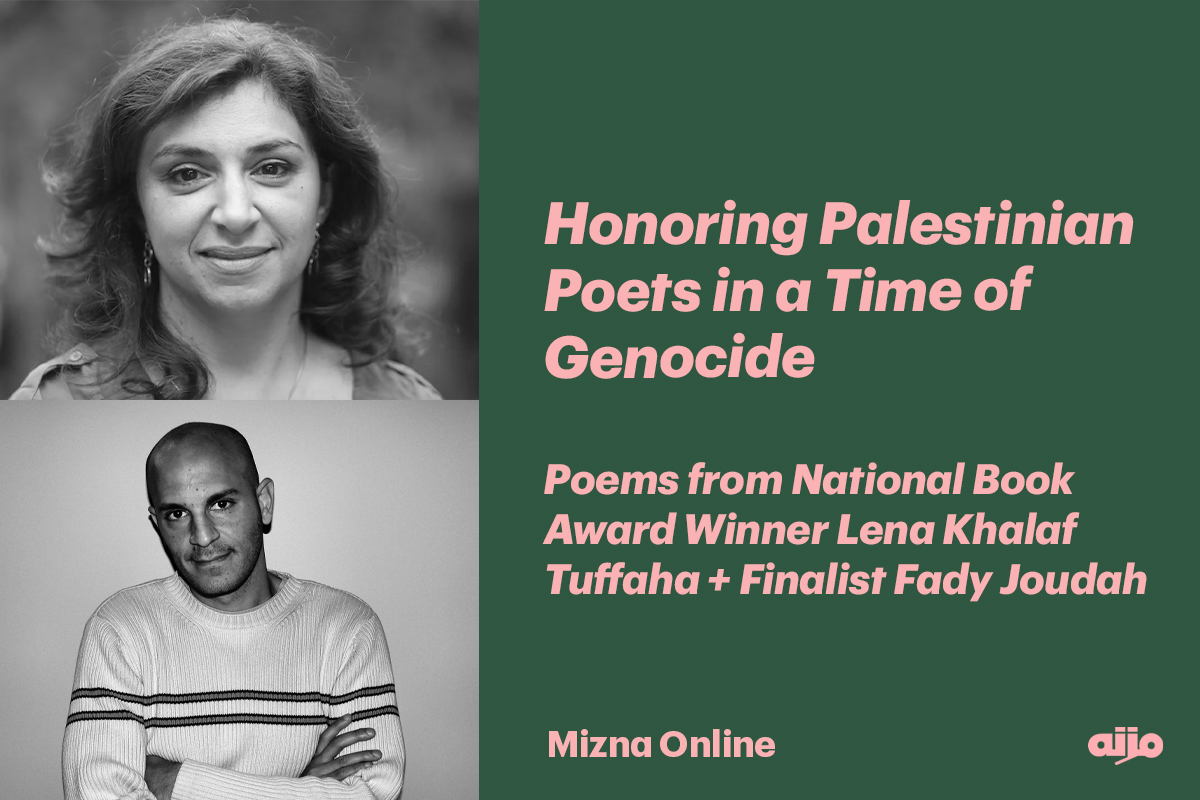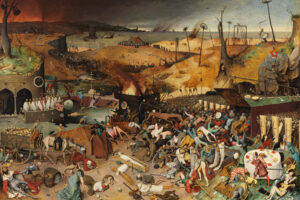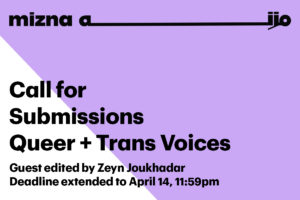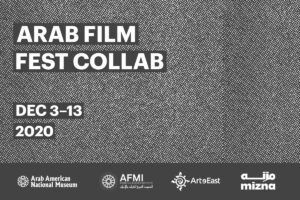
November 26, 2024
Honoring Palestinian Poets in a Time of Genocide: Poems from National Book Award Winner Lena Khalaf Tuffaha + Finalist Fady Joudah
For the first time in recent memory, since Naomi Shihab Nye’s nomination for 19 Varieties of Gazelle in 2002, the 2024 National Book Award finalist list was graced with the presence of Palestinian American poetry: the books of Fady Joudah and Lena Khalaf Tuffaha. Unsurprisingly, especially contextualized within a broader literary cultural sphere of Palestinians claiming that mere representational wins within the US can never be enough as the Zionist-American genocide spirals on, both Joudah and Tuffaha used their NBA platforms to call out American complacency and inspire further direct action to end this genocide and work toward a free Palestine. Lena Khalaf Tuffaha, who was the winner of the National Book Award in Poetry for her collection Something about Living, began her acceptance speech by reorienting us in space-time, translating a good evening in the US into a good morning to “beloved Gaza,” translating an annual ceremony in ordinary time in the US into the 411th day of genocidal escalation for Gaza.
The night before this historic win, at the finalists reading, Fady Joudah and Lena Khalaf Tuffaha were the only authors who used their platforms explicitly to bring Palestine into the space of the National Book Awards. There, Joudah performed a devastating new poem which was written for the occasion, turning toward the complicit US audience and daring to ask, “Wouldn’t you agree that Palestine today is the empire of the human heart?” Tuffaha read excerpts from Something about Living that connect today’s moment to other events in our ongoing Nakba, such as the great March of Return and the Zionist invasion of Lebanon, during which June Jordan’s “Moving towards Home” was written.
I sincerely hope that this NBA recognition inspires further critical attention to the lifelong bodies of work by these two brilliant poets. I am a longtime lover of Fady Joudah’s work, not merely for his capacity to expertly translate Palestinians living and dead, but also for his own poetry. The lyric momentum of the NBA-nominated collection […] is not a linear progression through our ongoing Nakba, but is instead a circular arc of returning. Traces and echoes from his earlier The Earth in the Attic and Alight appear recast through the Nakba of now—for it is and always was that same Nakba—in ways which ask the reader, if even implicitly, where have you been in all of this? Similarly, Something about Living, which was drafted and under contract before the Zionist entity’s 2023 genocidal escalations, embodies a line from Tuffaha’s Kaan and Her Sisters, “repetition is a Nakba,” as it creates un/knowable spectral rhymes between the current genocidal assault on journalists in Gaza and repetitions in recent history such as the assassination of Shireen Abu Akleh (allah yerhamha) and the broader question of, per Edward Said, Palestinian permission to narrate. The nonmetaphorical nature of our permission to narrate can be seen in the details of the post-National Book Award Nomination trajectory for both poets, with NPR censoring words such as “genocide” in their coverage.
I dream of one day assigning these two books together to future poetry students as they provide different models of lyric form and relationality through Nakba. Whereas Joudah’s […] embodies a generative formlessness, with poems liberated from titles and pronouns, that flow like water, undermining violent Western desires for self-explanation and qualification in such a poetics, Tuffaha’s Something about Living builds on her last book’s project of radicalizing Western poetic forms through sonnet crowns that grow thorns, centos composed entirely of Darwish lines, and poems riffing on intellectuals such as Edward Said alongside poets such as Myung Mi Kim and June Jordan.
Although the Western lyric is, at its essence, understood to be defined as the genre which directs its mimesis toward the performance of the mind in solitary thought (see these useful theses from Wendy Lotterman), the lyric “I” of Joudah’s […] directs its mimesis toward becoming an anti/mirror of sorts, refracting and reflecting the many ways that Western living’s unspoken assumptions are predicated on the annihilation of Palestinians. To be a “you” here, is to be not merely an annihilation of the “I” but to be unable to imagine, let alone build, an otherwise. Never have I seen a book so unapologetically unafraid to love Palestinians on our own terms, however il/legible to this world, from the river to the sea. Similarly, Tuffaha’s book, which ends with the lines, “I have no idea what hope is, but our people have taught me a million ways to love,” lingers in the details of our land, our love, and the space between. Here, “love is paying attention,” and also “the father who plants an olive tree for every newborn,” and also “a story we never tire of telling.” Whereas Joudah’s lyric “I” made generative space of the unexplained and unqualified, Tuffaha’s makes generative space of every act of naming: every poem made me research histories of Palestine I had never known, through names that cut through every settler mythos like a vector I never knew I needed. Here, to read Tuffaha’s work is, itself, to return to Palestine, however im/possibly.
To commemorate this historic moment for our community and hold its grief alongside anger at the failures of the US publishing industry, we are honored to publish these works, in hopes that they may inspire and embolden our community in this impossible hour. With this, echoing the words of Abdelrahman ElGendy, we offer our heartfelt congratulations to the National Book Foundation for being lucky enough to carry the names of Palestinian poets in a time like this.
—George Abraham, Mizna Executive Editor
Are you in solitude with market or in solidarity
with spectacle? Which part of you
isn’t a human shield? Whose body parts
are mine? Do you understand that I am
a national liberation movement?
—Fady Joudah
What is upon us
will require mercy. Let the plural be
a return of us.
— Lena Khalaf Tuffaha
Letter to June Jordan in September
by Lena Khalaf Tuffaha
I cannot pass the anniversary of that first news event of childhood without returning to your poem. How from my house I watched. And watching, watched my grief-stricken parents unable to speak. How I leaned into the screen, the chords of the cries, searching for what was recognizable of fingers and thighs, of bracelets and moustaches. Macabre arrangement of bodies with names like our own. I cannot pass without your words. Something about witnessing twice removed. About distances magnified by the shift into language. Of dailyness and my own children’s vernacular and the machine. Grinding us all in its jaws. I met a girl from the camp at a reading in Beirut. She asked if we could talk about the life of poetry. Our families are hauled off to the world of the dead, and every day it is on screen. In Gaza, we’re watching Ferguson, and in Atlanta we’re watching Jerusalem watching Minneapolis watching. Their weapons and their training programs indistinguishable. The word almost flickers for a nanosecond. Here I note the shelf-life of self-censorship, legacy of our era. Some days poems are scrawled on pieces of cardboard and carried on our shoulders at the protest like martyrs. Here I should say something about hope. Here I should say something about living.
On the Thirtieth Friday We Consider Plurals
by Lena Khalaf Tuffaha
At the border, a flock of journalists.
A sacrifice of tires burned behind us.
Beneath the picnic tents, a funeral of families.
What else will we become in Gaza if we gather,
if we carry our voices to the razored edge?
We were met by a gallop of prayers,
clamoring recitatives puncturing the shroud
of humid air. We were met by a delirium
of greetings, peace-be-upon-us surreal
between embraces, the horizon locked
and loaded. What is upon us
will require mercy. Let the plural be
a return of us. A carnage of blessings—
bodies freed from broken promises,
from the incumbrances of waiting.
Inimitable
by Fady Joudah
Is this the banality of evil reconvened?
Are you gen G?
Did you vote to make it great again
or was genocide never genocide to you?
Is there a light inside you dying
to go out? Who will you mine
to keep your night bright? How are you
always unprecedented
even as echo? Am I, a Palestinian, ever not
an analogy whose progenitor you are? What
makes your common decency heroic?
Why are you so often the baby
and I’m the bathwater?
Will you judge me if I reply Allahu akbar?
And when you forever hold my peace at your altar
is it with or without Salamu alaikum?
Or, if I say Free, free, will you fill in the blank
from the river to the sea?
What do you remember
of Iraqi memory? What if Palestinians
love their freedom more
than you love their unfreedom?
Did you know this about the way you love?
Did you convert my ashes to your gold dust?
“Horror beyond the reach of psychology,”
have you heard this expression before?
Are you in solitude with market or in solidarity
with spectacle? Which part of you
isn’t a human shield? Whose body parts
are mine? Do you understand that I am
a national liberation movement?
Can we hear it for tiny Lebanon
fighting off the mother of all crimes
as the laws that made you king said
one should? Have you been to Yemen
or just bombed it? How full of emissions
are you about your emissions?
When did you first export your wisdom
to those you destroy?
Do you really think I’ll forgive you
without you asking for forgiveness?
Why should you wait
until asking is synonymous with your defeat?
Wasn’t tragedy always there
before you sequenced it?
Is your methylated double helix
an individual or a corporation?
For example, when I say, “Horror
beyond the reach of genetics,”
will you give me or yourself a standing ovation?
Does Gaza come to mind?
Wouldn’t you agree
that Palestine today
is the empire of the human heart?
Have you thanked me or are you worried
I’ll charge you interest?
What about Sudan? Congo?
What have you done to the earth?
When were you in love last?
Was it any good?
What have you done to the remainder of my life?
Has it occurred to you
that you are a childhood robber?
Do you remember that game?
Was it ever a game?
Fady Joudah is the author of […] and six other collections of poems. He has translated several collections of poetry from the Arabic and is the co-editor and co-founder of the Etel Adnan Poetry Prize. He was a winner of the Yale Series of Younger Poets competition in 2007 and has received the Jackson Poetry Prize, a PEN award, a Banipal/Times Literary Supplement prize from the UK, the Griffin Poetry Prize, a Guggenheim Fellowship, and the Arab American Book Award. He lives in Houston, with his wife and kids, where he practices internal medicine.
Lena Khalaf Tuffaha is a poet, essayist, and translator. She is the author of Water & Salt which won the 2018 Washington State Book Award; Kaan and Her Sisters, a finalist for the Firecracker Award; and Something about Living, winner of the 2022 Akron Prize for Poetry and the National Book Awards 2024 for Poetry. Her writing has been published in journals including the Los Angeles Review of Books, The Nation, Poets.org, Protean Magazine, and Prairie Schooner, and in anthologies including The Long Devotion and We Call to the Eye & the Night. She was the translator and curator of the 2022 series Poems from Palestine at The Baffler. She is currently curating a series on Palestinian writers for Words Without Borders entitled Against Silence.

Toward a Free Palestine: Resources to Learn About and Act for Palestine
We are proud to present this text as part of a list of resources to take action for and learn about Palestine, as well as works by Palestinian artists, writers, activists, and cultural workers.












